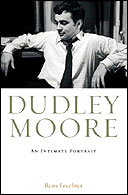
Dudley Moore: An Intimate Portrait
by Rena Fruchter
Ebury £17.99, pp384
The early Dudley Moore I remember was hilarious and effortless, one of the brightest student sparks of our generation. He could, seemingly, do anything: play Bach or Bartok like an angel, then tell lewd gags better than Max Miller. But he also seemed somehow grounded and normal, defined by a fizzing intelligence. Bright, bright, bright.
The later Moore who stalks these pages is different in kind. Freaky, flailing and sad beyond the tragedy of a mortal illness. Four wives, 45 years and one Hollywood career later, any trace of normality has left him. Dull, dull, dull. He has become a true modern monster, a celebrity.
Rena Fruchter, billed here as a pianist and journalist ('The youngest writer ever appointed associate music critic of the Boston Herald at the age of 18,' it says rather ominously on the dust-jacket), befriended Malibu Dud in the last decade of his life. They played music together and travelled the concert circuit when movie offers ran dry.
Rena, a large, loud lady, was platonic best friend Number One. Moore, sickening with progressive supranuclear palsy, went on family holidays with Rena and her heroic husband, Brian, before moving in with them as permanent house guest cum patient.
She cared for him when all his other options had left town. She sounds a thoroughly good egg. But, alas, her literary omelettes are filled with clichés ('Dudley showed us that the only reality is in the truth of who you are, what you feel, how you act') and her talent for reconstructed dialogue lies somewhere between soft boiled and addled.
This memoir tells us little more than that Dud's last wife, Nicole, was a screaming horror, that he couldn't live with or without her, and that he was awesomely messed up. None of the greatness she ritually ascribes to Moore is proven. She takes him at his own box-office valuation - say $35 million - and sticks gallantly by him when the cupboard proves bare. But how did he ever come to fall on such harrowing times?
Every showbiz success story, perhaps, needs the drama of a struggle against great odds bravely waged. Moore was a poor, titchy lad from Dagenham with a mother called Ada and a club foot. 'The image of deformity was always in his mind, in the physical portrait of himself he carried inside his head... the fact that beautiful women wanted to be with him was a boost to his ego, but could not erase the damage that had been done.' He was brilliant and attractive, with a 'substantial intellect - but he continued to battle feelings of inferiority'.
Oh please. The Dagenham boy at Oxford long ago, playing organ in Magdalen chapel or cabaret clubbing around church halls, was always superior in a relaxed, clownish way, always at home in a body which raised laughs whenever he wanted. He didn't have an Essex accent. He was already a star. The move beyond the fringe wasn't some amazement. And the move beyond that - with Peter Cook - was a pre-written script unrolling. They were the best because they were so damned clever. Substantial intellects.
This Dud, young Dud, was a recognisable human being. He married Suzy Kendall and they lived simply, careless of possessions. Kendall seemed then - and seems still - a caring woman, an extraordinary beauty with ordinary, decent instincts. Where did they both go wrong?
The Moore who broke up with a boozy Cook in his early forties and went to Hollywood (to marry and divorce Tuesday Weld, Brogan Lane and wretched Nicole) is the different Dudley. He had a few big hits. His talent - as ever - made him appear remarkable. But is Arthur in fact so remarkable? Was 10 more than slick sleaze, mugging and Bo Derek's bod?
The fact is that the later Moore never stretched himself, never got his juices flowing again. He was running on ego, dollars and empty. The women and wine were just ways of filling in time. His music - his gift - was the only wonder that remained, a residual badge of creative respectability. The rest was Hollywood, dodgy accountants, divorce lawyers, available women and tinsel.
Had old Dud, like young Dud, a tart turn of phrase? No sign of it here. There's only one laugh (when Nicole decamps to Telluride and finds it no haven of peace). 'What did she expect? She brought herself along.' Old Dud, without roots, has lost any sense of his first sweet self. He's a charming, shrugging shell. His death, slowly wasting, slowly losing any sense of dignity, is grim beyond words.
The celebrity slips away. The reason why so many said they loved him remains elusive. Bright Dud, Good Dud, you were the one to remember. You made it so miraculously easy, until California dreaming turned to ashes as usual.

